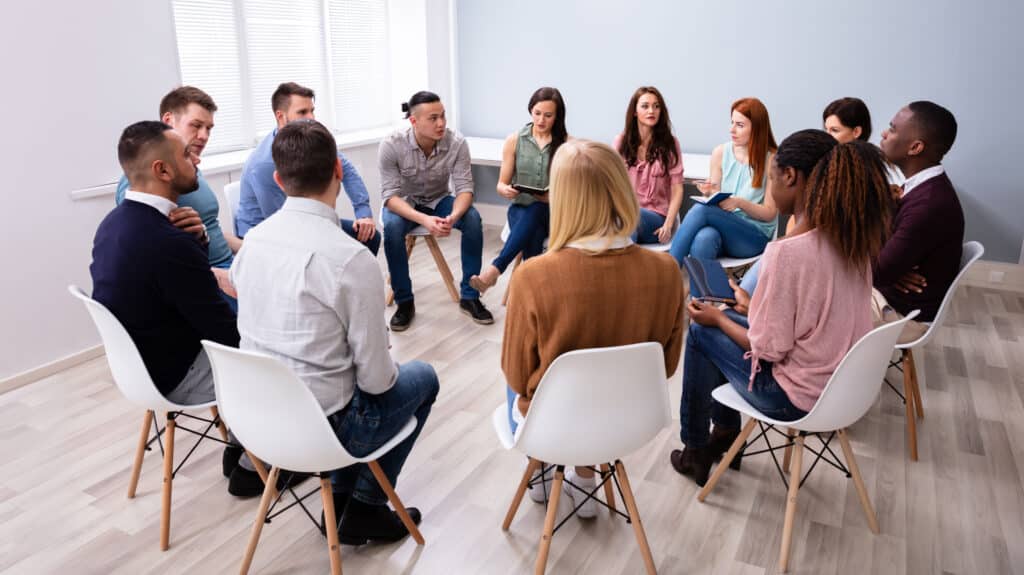Group therapy is widely used in drug and alcohol addiction recovery. Rather than a one-on-one meeting with a therapist, group therapy is a gathering of several people facilitated by a clinical group leader.
Meeting as a group allows peers who struggle with the same issues to:
- learn from each other
- grow and heal together
- discuss shared experiences
- give new perspectives
- create a sense of community
- fight isolation
- learn to relate to others
- practice empathy
- believe recovery is possible
For group therapy to provide the greatest benefit, it helps to have a structured recovery group rather than an open, unguided discussion. Group topics or activities can improve communication and build relationships between peers.
Some people from your support group in substance abuse treatment may be your support system after rehab, too.
Here are 7 substance abuse group therapy activities that facilitate growth and healing.
1. An Ice Breaker
A good way to start the first group therapy meeting is to have each person share something about themselves. Make it something interesting—such as a funny habit, an unusual preference, or a life-changing experience.
Icebreakers help people get to know each other and encourage them to be vulnerable. They may incite laughter and strengthen the feelings of camaraderie and community.
2. Cognitive Behavioral Therapy
Many group sessions use cognitive behavioral therapy (CBT). CBT is a form of psychotherapy that examines your thinking patterns and how they lead to bad habits. A therapist helps you learn to think differently so your actions can lead to a healthier life.
Group CBT is effective because many people deal with defective thought patterns. Group members can work together to learn coping skills and relapse-prevention strategies.
Some skills may be directly related to abstinence, such as ways to avoid triggers to substance use, resist relapse, and say “no” if someone offers you alcohol or drugs.
Other skills might be necessary to live a healthy, sober life and improve your overall well-being. These include stress management, problem-solving, relaxation, and anger management.
3. Talking About Self-Care
When you’re severely addicted, you aren’t taking care of yourself. You’re damaging your body and mind with drugs or alcohol. You’re likely to neglect proper nutrition, exercise, and sleep.
Talking about self-care in a group setting shows that everyone struggles with this issue. It spreads awareness of the importance of self-care for healing and recovery.
After detox, you may still have cravings, especially if you’ve abused opioids or other depressant drugs. Self-care nurtures your physical and mental health and encourages you to have a healthy relationship with yourself.
As a group, you can do self-affirmations to build self-esteem and ingrain the idea that you are valuable and deserve to be cared for. This love for yourself is essential to the recovery process. Talking about self-care with others can make them feel more worthy of love, too.
4. Practicing Mindfulness
Mindfulness is the awareness of the world around you, how it affects you, and how you respond to it. Many people don’t pay attention to these things. They feel shame about the past or fear about the future. They hurt others without realizing that their words and actions are powerful.
When you practice mindfulness, you ground yourself in the present moment. You become aware of what you are doing and saying and how it is affecting others as well as yourself. You let go of the past and future (which are often triggers to substance abuse). You’re able to see the present more clearly, which allows you to make wiser choices.
Practicing mindfulness as a group reinforces positive interactions and shows how little the past and future matter in everyday life. It also encourages the one-day-at-a-time philosophy, which makes sobriety seem less overwhelming.
5. Talking About Your Best & Worst Moments
Talking about the best and worst thing that’s ever happened to you shows group members that experience is subjective. Your best may be better than someone else’s. Your worst might not be as bad. Or it might be worse.
Regardless, you all made it through your experiences and are in recovery together. Sharing intense experiences can bond people and prevent them from judging themselves and others unfairly.
6. Giving Advice To Your Childhood Self
This activity could also be used as an icebreaker. Each person tells what advice they would give to their childhood self if they could go back in time knowing what they know now.
This advice might be to avoid something that started them down the path to drug or alcohol abuse. It might be a regret in life they don’t realize is connected to substance abuse. Speaking these things out loud to others can give everyone a different perspective.
7. Role-Playing
Playing charades or pretending to work out a conflict teaches group members about body language, self-expression, and creative thinking. Role-playing as a group can strengthen relationships and build mindfulness skills.
At Northeast Addictions Treatment Center, we provide group therapy for all types of alcohol and drug addiction. Contact one of our treatment specialists to learn more and start your recovery journey today.
People Also Read:
- 10 Common Topics In Substance Abuse Group Therapy
- Why Counseling Is So Important For Addiction Recovery
- Substance Abuse Treatment Plans: 4 Things You Need to Know
- 5 Of The Best Online Alcohol Support Groups
- Family Support Groups For Addiction & Mental Health
Sources:
- Substance Abuse and Mental Health Services Administration — 2 Types of Groups Commonly Used in Substance Abuse Treatment
- Substance Abuse and Mental Health Services Administration — Group Therapy in Substance Use Treatment

